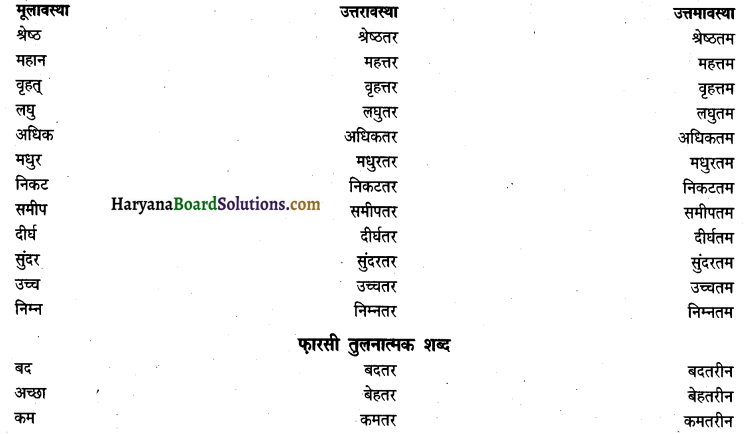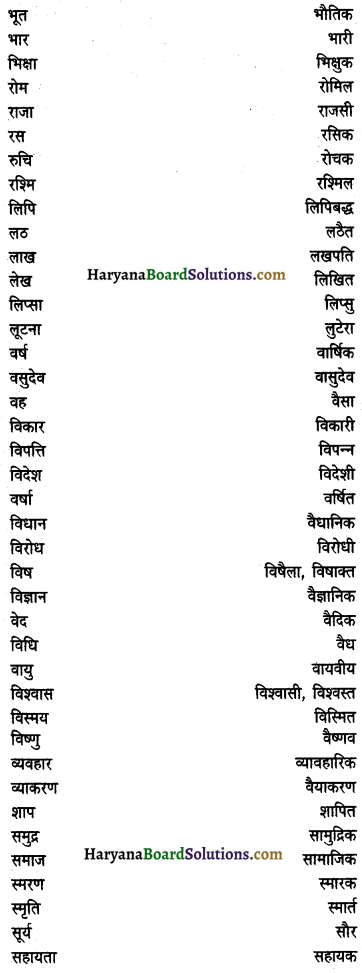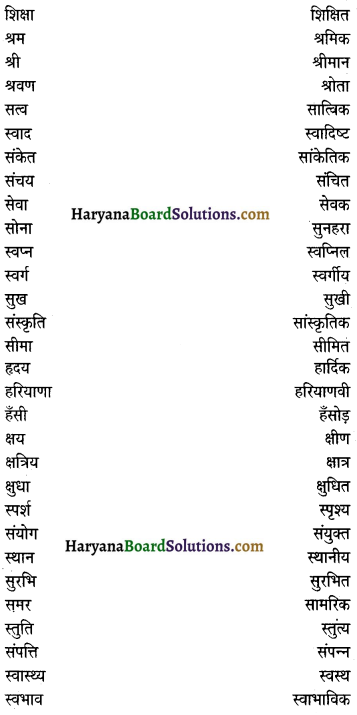HBSE 10th Class English Solutions Footprints without Feet Chapter 3 The Midnight Visitor
Haryana State Board HBSE 10th Class English Solutions Footprints without Feet Chapter 3 The Midnight Visitor Textbook Exercise Questions and Answers.
Haryana Board 10th Class English Solutions Footprints without Feet Chapter 3 The Midnight Visitor
HBSE 10th Class English The Midnight Visitor Textbook Questions and Answers
The Midnight Visitor Solutions HBSE 10th Class Question 1.
How is Ausable different from other secret agents?
(ऑसबल दूसरे गुप्तचरों से कैसे भिन्न है?)
Answer:
Ausable is a secret agent. But he is different from other secret agents. Generally, a secret agent has such a personality that he is not easily recognized in a crowd. But Ausable is short and very fat. His accent is also marked.
(ऑसबल एक गुप्तचर है। लेकिन वह दूसरे गुप्तचरों से भिन्न है। प्रायः एक गुप्तचर का व्यक्तित्व इस प्रकार का होता है कि उसे भीड़ में आसानी से पहचाना नहीं जा सकता है। लेकिन ऑसबल छोटा और अत्यधिक मोटा है। उसका बोलने का लहजा भी भिन्न है।)
![]()
The Midnight Visitor Hindi Translation HBSE 10th Class Question 2.
Who is Fowler and what is his first authentic thrill of the day?
(फाऊलर कौन है और उस दिन का उसका वास्तविक रूप से पहला रोमांच क्या है?)
Answer:
Fowler is a young writer. He wants to meet Ausable because he wants to write
(ऑसबल कहता है कि वह छज्जे पर स्थित आम खिड़की के माध्यम से कमरे में घुसा है। उसने कहा कि वह छज्जे के बारे में होटल के प्रबंधकों से शिकायत करेगा।)
Think about it
Class 10 Footprints Without Feet Chapter 3 HBSE Question 1.
“Ausable did not fit any description of a secret agent Fowler had ever read.” What do secret agents in books and films look like, in your opinion? Discuss in groups or in class some stories or movies featuring spies, detectives and secret agents, and compare their appearance with that of Ausable in this story. (You may mention characters from fiction in languages other than English. In English fiction you may have come across Sherlock Holmes, Hercule Poirot, or Miss Marple. Have you watched any movies featuring James Bond?)
(फाऊलर ने गुप्तचरों के बारे में जितना भी पढ़ रखा था उसके अनुसार ऑसबल बिल्कुल भी एक गुप्तचर जैसा नहीं लग रहा था। आपके विचार में पुस्तकों और फिल्मों में गुप्तचर कैसे दिखते हैं टोलियाँ बनाकर या कक्षा में गुप्तचरों, भेदियों और जासूसों वाली कहानियों और फिल्मों पर चर्चा करें और उनमें वर्णित पात्रों की ऑसबल के साथ तुलना करें। (आप अंग्रेज़ी भाषा से अलग अन्य भाषाओं के उपन्यासों में से भी पात्र ले सकते हैं। अंग्रेज़ी उपन्यासों में आपने शेरलॉक होम्स, हरक्यूल पाइरॉट और मिस मार्पल के बारे में पढ़ा होगा। क्या आपने जेम्स बाँड की कोई फिल्म देखी है?)
Answer:
Ausable does not look like a secret agent. There is a particular picture of a secret agent in the mind of the public. Ausable does not fit in that picture. The secret agents in books and films look differently. A secret agent should have a personality that does not become too evident. If a secret agent is very fat or very thin, he may be recognized by others. In films, the secret agent has a hat on his head. Yes, I. have seen some movies featuring James Bond, these are : The Golden Eye, Tomorrow Never Dies. The Moonraker, etc.
(ऑसबल एक गुप्तचर की भाँति नहीं दिखता है। लोगों के मन में गुप्तचर की एक विशेष तस्वीर होती है। ऑसबल उस तस्वीर में सही नहीं बैठता है। किताबों और फिल्मों में गुप्तचर भिन्न दिखते हैं। एक गुप्तचर का व्यक्तित्व ऐसा होना चाहिए जोकि बिल्कुल अलग नजर नहीं आना चाहिए। यदि गुप्तचर बहुत मोटा या बहुत पतला है तो उसे दूसरों के द्वारा पहचाना जा सकता है। फिल्मों में, गुप्तचर के सिर पर टोप होता है। हाँ, मैंने जेम्स बाँड की कुछ फिल्में देखी हैं, ये फिल्में हैं ‘The Golden Eye’, “Tomorrow Never Dies’, ‘The Moonraker’इत्यादि।)
The Midnight Visitor Summary Class 10 HBSE Question 2.
How does Ausable manage to make Max believe that there is a balcony attached to his room? Look back at his detailed description of it. What makes it a convincing story?
(ऑसबल मैक्स को कैसे यकीन दिला देता है कि उसके कमरे के बाहर एक छज्जा बना है? इसके पीछे वर्णित विस्तृत व्याख्या को देखिए। कौन-सी बात इसे एक विश्वसनीय कहानी बनाती है?)
Answer:
First of all Ausable says that max would have entered the room through a window in the balcony. Then he says there is a balcony before his room and the other adjoining it. After some time he says that he would complain to the management about the balcony. Then he tells Max this balcony goes to the next room from his room’s window. All these things convince Max that there is a balcony. When there is a knocking on the door, Ausable tells Max that there is police at the door. Max is frightened. He tries to go into the balcony from the window. But there is no balcony. He falls from the window to meet his death.
(सबसे पहले तो ऑसबल कहता है कि मैक्स ने छज्जे पर स्थित खिड़की के माध्यम से कमरे में प्रवेश किया होगा। तब वह कहता है कि उसके कमरे के सामने दूसरे कमरे के साथ मिलता हुआ एक छज्जा है। कुछ समय के पश्चात् वह कहता है कि वह छज्जे के बारे में होटल के प्रबंधकों से बात करेगा। तब वह मैक्स को बताता है कि यह छज्जा उसके कमरे की खिड़की से होकर दूसरे कमरे तक जाता है। ये सारी चीजें मैक्स को छज्जे के होने के बारे में विश्वास दिला देती हैं। जब दरवाजे पर दस्तक की आवाज आती है तो ऑसबल मैक्स से कहता है कि दरवाजे पर पुलिस है। मैक्स डर जाता है। वह खिड़की के रास्ते छज्जे पर जाने का प्रयास करता है। परन्तु वहाँ पर कोई छज्जा नहीं है। वह खिड़की से नीचे गिर जाता है और मर जाता है।).
![]()
The Midnight Visitor Summary In Hindi HBSE 10th Class Question 3.
Looking back at the story, when do you think Ausable thought up his plan for getting rid of Max? Do you think he had worked out his plan in detail right from the beginning? Or did he make up a plan taking advantage of events as they happened?
(कहानी पर नजर मारते हुए बताइए कि ऑसबल ने मैक्स से छुटकारा पाने की योजना कब सोची थी? क्या आपके विचार में उसने शुरू से ही अपनी योजना को विस्तार से अमल में लाना शुरू कर दिया था? अथवा क्या उसने घटित परिस्थितियों का फायदा उठाकर अपनी योजना बना ली?)
Answer:
When Ausable switched on the light, he saw Max in his room. Max had a small automatic pistol in his hand. Ausable felt shocked to see him. But his mind was very sharp. He decided there and then to get rid of Max. It appears that he had not worked out his plan in detail right from the beginning. He made the plan only when he saw Max there.
(जब ऑसबल ने बत्ती जलाई तो उसने अपने कमरे में मैक्स को देखा। मैक्स के हाथ में एक छोटी स्वचालित पिस्तौल थी। उसे देखकर ऑसबल को सदमा पहुँचा। लेकिन उसका दिमाग बहुत तेज था। उसने तभी मैक्स से छुटकारा पाने के बारे में सोच लिया। ऐसा लगता है कि उसने आरंभ से ही अपनी योजना को अमल में लाने का कार्य नहीं किया था। उसने केवल मैक्स को देखकर ही अपनी योजना बनाई।)
Talk about it
The Midnight Visitor Very Short Question Answer HBSE 10th Class Question 1.
In this story, Ausable shows great presence of mind,’ or the ability to think quickly and act calmly and wisely, in a situation of danger and surprise. Give examples from your own experience, or narrate a story, which shows someone’s presence of mind.
(इस कहानी में ऑसबल अत्यधिक हाजिर जवाबी अथवा खतरे और हैरानी वाली परिस्थिति में शीघ्र सोचकर, शांत मन से और बुद्धिमानी के साथ निर्णय लेने का प्रदर्शन करता है। अपने अनुभव के आधार पर कुछ उदाहरण दीजिए, या किसी की दिमागी चुस्ती से संबंधित कुछ उदाहरण दीजिए।)
Answer:
I remember one incident which was related to me by one of my friends. It concerns a young man who appeared for an interview for a high level post in a company. The chairman of the interview committee wanted to confuse the candidate. But the young man had great presence of mind. The chairman asked the candidate whether he would like to be asked one difficult question or two easy questions. The candidate said that he would like to be asked one difficult question. The interviewer asked him, “Which came first night or day?” The candidate thought for some time and then said, “Day.” At this the chairman asked him, “How have you calculated that the day came first, and not the night?” At this the candidate replied, “You had promised that you would ask only one difficult question. The chairman appreciated the candidate’s presence of mind and selected him for the job.
(मुझे एक घटना याद है जो मुझे मेरे एक मित्र के द्वारा सुनाई गई थी। यह घटना एक नवयुवक से संबंधित है जोकि एक कंपनी में एक ऊँचे दर्जे के पद के लिए साक्षात्कार देने आया था। साक्षात्कार समिति के सभापति ने उसे उलझाने का प्रयास किया। लेकिन नवयुवक अत्यधिक दिमागी चुस्ती वाला था। सभापति ने उससे पूछा कि वह क्या चाहेगा कि उससे एक कठिन प्रश्न अथवा दो आसान प्रश्न पूछे जाएँ। प्रत्याशी ने उत्तर दिया कि वह चाहेगा कि उससे एक कठिन सवाल पूछा जाए। साक्षात्कार लेने वाले ने पूछा, “पहले क्या आया था, दिन या रात?” प्रत्याशी ने थोड़ी देर सोचा और फिर कहा, “दिन” इस पर सभापति ने उससे पूछा, “आपने यह गणना कैसे कर ली कि पहले दिन आया था, रात नहीं?” इस पर प्रत्याशी ने उत्तर दिया, “आपने वचन दिया था कि आप केवल एक कठिन प्रश्न पूछेगे।” सभापति ने प्रत्याशी की दिमागी चुस्ती की तारीफ की और नौकरी के लिए उसका चयन कर लिया।)
Class 10 Footprints Without Feet Chapter 3 Question Answer HBSE Question 2.
Discuss what you would do in the situations described below. Remember that presence of mind comes out of a state of mental preparedness. If you have thought about possible problems or dangers, and about how to act in such situations, you have a better chance of dealing with such situations if they do arise.
A small fire starts in your kitchen.
1. A child starts to choke on a piece of food.
2. An electrical appliance starts to hiss and gives out sparks.
3. A bicycle knocks down a pedestrian.
4. It rains continuously for more than twenty-four hours.
5. A member of your family does not return home at the usual or expected time.
You may suggest other such situations.
(चर्चा करें कि निम्नलिखित स्थितियों में आप क्या करते। याद रहे कि हाजिर-जवाबी एक मानसिक तैयारी की दशा में ही आती है। यदि आपने संभव कठिनाइयों और खतरों के बारे में सोच लिया है और इन परिस्थितियों में कैसे काम करना है, तो यदि ऐसी परिस्थितियाँ पैदा होती हैं तो आपके पास इनसे निपटने के बेहतर अवसर उपलब्ध होंगे।)
1. आपकी रसोई में थोड़ी आग लग जाती है।
2. भोजन का टुकड़ा बच्चे के गले में फंस जाता है।
3. एक विजली उपकरण आवाज के साथ चिंगारियाँ बाहर निकालने लगता है।
4. साइकिल पदयात्री के साथ टकरा जाती है।
5. चौबीस घंटे से भी अधिक समय तक लगातार वर्षा होती है।
6. आपके परिवार का एक सदस्य निर्धारित अथवा संभावित समय पर घर नहीं लौटता है।
(आप ऐसी कुछ अन्य परिस्थितियाँ भी सुझा सकते हैं।)
Answer:
For discussion at the class level with the help of the teacher.
(विद्यार्थी अध्यापक की सहायता से स्वयं करें।)
HBSE 10th Class English The Midnight Visitor Important Questions and Answers
Very Short Answer Type Questions
Question 1.
Who was Ausable?
Answer:
Ausable was a secret agent.
Question 2.
Who was Fowler?
Answer:
Fowler was a romantic writer.
Question 3.
What did Max have in his hand?
Answer:
He had a pistol in his hand.
Question 4.
Who was in Ausable’s room?
Answer:
An intruder, named Max, was in Ausable’s room.
![]()
Question 5.
Who came to meet Ausable?
Answer:
Fowler came to meet Ausable.
Question 6.
From where was Ausable brought to Paris?
Answer:
Ausable was brought to Paris from Boston.
Question 7.
Where was Ausable staying?
Answer:
He was staying on the sixth floor of a French hotel.
Question 8.
How did Fowler feel to meet Ausable?
Answer:
He was disappointed to meet Ausable.
Question 9.
What was someone expected to bring to Ausable’s room?
Answer:
Someone was expected to bring a paper containing important information about new missiles.
![]()
Question 10.
What was the name of the waiter?
Answer:
His name was Henry.
Question 11.
Who knocked at Ausable’s room/door?
Answer:
The waiter of the hotel, Henry, Knocked at Ausable’s room/door.
Question 12.
How has Max got in?
Answer:
Max got in with the help of a passkey by opening the main door.
Question 13.
What did Ausable tell Max, who was knocking at the door?
Answer:
Ausable told Max that the police were knocking at the door.
Question 14.
Who jumped onto the balcony?
Answer:
Max jumped onto the balcony.
![]()
Question 15.
Was there a balcony outside the window of Ausable’s room?
Answer:
No, there was not any balcony outside the window of Ausable’s room.
Question 16.
When Ausable and Fowler entered the room what did they see?
Answer:
They saw that a man was standing in the centre of the room with a pistol in his hand.
Short Answer Type Questions
Question 1.
Why did Fowler want to meet Ausable? Why was he disappointed?
(फाऊलर ऑसबल से क्यों मिलना चाहता था? उसे निराशा क्यों हुई?)
Answer:
Fowler was a young and romantic writer. He wanted to meet Ausable because he was a secret agent. He was disappointed to meet Ausable because he was a fat sloppy fellow. He was not romantic. He lived in a small room in a gloomy hotel
(फाऊलर एक यवा और रोमांचकारी लेखक था। वह ऑसबल से मिलना चाहता था क्योंकि वह एक गुप्तचर था। वह ऑसबल से मिलकर थोड़ा निराश हुआ क्योंकि वह मोटा पिलपिला व्यक्ति था। वह रोमांचकारी नहीं था। वह एक अँधेरे वाले होटल के छोटे से कमरे में रहता था।)
Question 2.
What was someone expected to bring to Ausable’s room?
(ऑसबल के कमरे में किसी के क्या लेकर आने की संभावना वी?)
Answer:
Someone was expected to bring a paper containing important information to Ausable’s room.
(किसी के एक महत्त्वपूर्ण सूचना का पत्र लेकर ऑसबल के कमरे में आने की संभावना थी।)
Question 3.
Who was in Ausable’s room? What was in his hand?
(ऑसबल के कमरे में कौन था? उसके हाव में क्या था?)
Answer:
A man named Max was there in Ausable’s room. He was another secret agent. He had an automatic pistol in his hand..
(मैक्स नाम का एक आदमी ऑसबल के कमरे में था। वह एक अन्य गुप्तचर था। उसके हाथ में एक स्वचालित पिस्तौल थी।)
Question 4.
What did the secret agent tell Max when he heard the knock?
(गुप्तचर ने मैक्स को क्या बताया जब उसने दरवाजे पर खटखटाहट सुनी?)
Answer:
He told Max that it would be the police. He said that he had called the police for the protection of such an important paper that he was going to receive that night. He wanted to have extra protection for the report.
(उसने मैक्स को बताया कि वह पुलिस होगी। उसने कहा कि उसने स्वयं ही पुलिस को इतने महत्त्वपूर्ण पत्र की सुरक्षा के लिए बुलाया था जिसको वह उस रात प्राप्त करने जा रहा था। वह रिपोर्ट के लिए अतिरिक्त सुरक्षा चाहता था।)
![]()
Question 5.
Did Ausable know that it was the waiter who had knocked at the door?
(क्या ऑसबल जानता था कि जिसने दरवाजे पर दस्तक दी है वह बैरा था?)
Answer:
Yes, Ausable knew that the man knocking at the door was the waiter. He had ordered him to bring a bottle of wine. And he knew that the waiter must have come with the drinks.
(हाँ, ऑसबल जानता था कि दरवाजे पर दस्तक दे रहा आदमी बैरा था। उसने उसे एक बोतल शराब लाने का आदेश दिया था। और वह जानता था कि बैरा निश्चित रूप से शराब लेकर ही आया होगा।)
Question 6.
Was there a balcony outside the window? Give instances from the text in support of your answer.
(क्या खिड़की से बाहर कोई छज्जा वा? अपने उत्तर के समर्थन में पाठ में से उदाहरण दीजिए।)
Answer:
No, actually there was not a balcony outside the window. Ausable had falsely told Max about the balcony. When Max dropped himself to the balcony, he screamed. He fell down to the ground from the sixth floor. In the end, Ausable told Fowler, “No, he won’t return.”
(नहीं, वास्तव में खिड़की के बाहर छज्जा नहीं था। ऑसबल ने मैक्स को छज्जे के बारे में झूठ बताया था। जब मैक्स ने छज्जे के ऊपर छलांग लगाई तो वह चिल्लाया। वह छठी मंजिल से जमीन पर जा गिरा। अंत में, ऑसबल ने फाऊलर को बताया, “नहीं, वह कभी नहीं लौटेगा।”)
Question 7.
What story did Ausable tell Max about the balcony? Why did he tell him so?
(ऑसबल मैक्स को छज्जे के बारे में क्या कहानी बताई? उसने उसे ऐसा क्यों बताया?)
Answer:
Ausable told Max that there was a balcony just outside the window of the room. That balcony leads to the next compartment of the hotel. Last week another person also intruded his room through the balcony. It was all a part of his plan to trap Max.
(ऑसबल ने मैक्स को बताया कि कमरे की खिड़की के ठीक बाहर एक छज्जा था। वह छज्जा होटल के अगले कमरे की ओर जाता है। पिछले हफ्ते एक अन्य व्यक्ति ने छज्जे के माध्यम से मेरे कमरे में घुसपैठ की। यह मैक्स को फँसाने की उसकी योजना का एक हिस्सा था।)
![]()
Question 8.
How did Ausable get rid of Max?
(ऑसबल ने मैक्स से कैसे छुटकारा पाया?)
Answer:
Ausable cocked up a story. He told Max that there was a balcony just below of his window. He told him that the balcony was a part of the next room. When the waiter knocked at the door, Ausable told Max that it would be the police. Max was nervous. He dropped himself to the balcony through the window. But outside there was no balcony. He fell down and died.
(ऑसबल ने एक मनगढ़ंत कहानी बनाई। उसने मैक्स को बताया कि उसकी खिड़की के नीचे एक छज्जा है। उसने उसे बताया कि यह छज्जा अगले कमरे का एक भाग है। जब बैरे ने दरवाजे पर दस्तक दी, ऑसबल ने मैक्स को बताया कि वह पुलिस होगी। मैक्स घबरा गया। उसने खिड़की के रास्ते छज्जे पर छलांग लगा दी। लेकिन खिड़की के बाहर कोई छज्जा नहीं था। वह नीचे गिर गया और मारा गया।)
Question 9.
How did Ausable behave to see Max in his room?
(मैक्स को अपने कमरे में देखकर ऑसबल ने कैसा व्यवहार किया?)
Answer:
To see Max in his room Ausable remained cool and silent. He was not afraid of Max. He seemed to be angry with the management of the hotel regarding the balcony below the window of his room.
(मैक्स को अपने कमरे में देखकर ऑसबल शांत और खामोश रहा। वह मैक्स से डरा हुआ नहीं लग रहा था। वह अपनी खिड़की के नीचे छज्जे को लेकर होटल के प्रबंधकों से नाराज़ दिखाई दिया।)
Question 10.
Describe Ausable.
(ऑसबल का वर्णन कीजिए।)
Answer:
Ausable was a secret agent. He was a fat and sloppy fellow. He was not a romantic figure. He had come to Paris from Boston twenty years ago. He could speak French and German passably. He had a style of his own in American language.
(ऑसबल एक गुप्तचर था। वह एक मोटा और पिलपिला व्यक्ति था। वह एक रोमांचकारी व्यक्ति नहीं था। वह बीस वर्ष पहले बोस्टन से पैरिस आया था। वह कामचलाऊ ढंग से जर्मन और फ्रैंच भाषा बोल सकता था। लेकिन अमेरिकी भाषा बोलने का उसका अपना एक विशेष ढंग था।)
![]()
Question 11.
Who came to meet Ausable? What was his profession?
(ऑसबल से मिलने कौन आया? उसका पेशा क्या था?)
Answer:
Fowler came to meet Ausable. He was professionaly writer. He wants to write about a secret agent. So he wanted to meet Ausable because he was a secret agent.
(ऑसबल से मिलने फाऊलर आया। वह एक लेखक था। वह एक गुप्तचर के बारे में लिखना चाहता था। इसलिए वह ऑसबल से मिलना चाहता था क्योंकि ऑसबल एक गुप्तचर था।).
Essay Type Questions
Question 1.
Why did Fowler want to meet Ausable? In the beginning of the story Fowler felt disappointed with Ausable. Do you think Fowler had the same feeling towards the end of the story? Give reasons for your answer.
(फाऊलर ऑसबल से क्यों मिलना चाहता था? कहानी के आरंभ में फाऊलर ऑसबल के साथ मुलाकात से उदास था। क्या आप सोचते हो कि कहानी के अंत में भी उसकी यही भावना थी? अपने उत्तर के पक्ष में तर्क दीजिए।)
Answer:
Fowler wanted to meet Ausable because he was a secret agent. In the beginning of the story Fowler felt disappointed with Ausable because he did not at all look like a secret agent of his imagination. He found him quite boring. He did not want to be with him any more. But when he found Max in his room with a gun, he was thrilled. He found that Ausable was not at all perturbed.He cocked-up a story about the balcony outside his window. When the waiter knocked at the door. Ausable told Max that it wo told him that he had called the police for the security of that important paper. Hearing this Max jumped outside the window to the balcony. But there was no balcony. He fell down from the sixth floor and died. Thus, Fowler was thrilled to see all this. So towards the end of the story he was not disappointed with Ausable.
(फाऊलर ऑसबल से इसलिए मिलना चाहता था क्योंकि वह एक गुप्तचर था। कहानी के आरंभ में फाऊलर ऑसबल को देखकर बहुत निराश हुआ क्योंकि वह उसकी कल्पनाओं के गुप्तचर की भाँति बिल्कुल भी नज़र नहीं आ रहा था। उसने उसे बिल्कुल नीरस पाया। वह उसे बिल्कुल भी और अधिक नहीं चाहता था। लेकिन जब उसने मैक्स को उसके कमरे में हाथ में बंदूक लिए खड़ा पाया तो वह रोमांचित हो गया। उसने देखा कि ऑसबल बिल्कुल भी परेशान नहीं था। उसने अपने कमरे की खिड़की के बाहर छज्जे के बारे में एक मनगढ़ंत कहानी बनाई। जब बैरे ने दरवाजे पर दस्तक दी तो ऑसबल ने मैक्स को बताया कि यह पुलिस होगी। उसने उसे बताया कि उसने ही पुलिस को इतने महत्त्वपूर्ण पत्र की सुरक्षा के लिए बुलाया था। यह सुनकर मैक्स खिड़की में से बाहर छज्जे पर कूदा। लेकिन वहाँ छज्जा नहीं था। वह छठी मंजिल से नीचे गिरा और मारा गया। इस प्रकार फाऊलर यह सब देखकर बहुत रोमांचित हुआ। इसलिए कहानी के अंत में वह ऑसबल के प्रति निराश नहीं था।)
![]()
Question 2.
Describe the incident leading to the death of Max.
(मैक्स की मृत्यु की घटना का वर्णन कीजिए।)
Answer:
Ausable was a secret agent. He was living in a French hotel. His room was at the sixth and top floor of the hotel. One evening a young writer named Fowler came to ineet him. When they entered the room and switched on the light, they found a man standing in the centre of the room. He had a pistol in his hand. His name was Max. He came there to grab the important report from Ausable. Seeing Max, Ausable remained cool and silent. But he seemed to be angry with the management of the hotel. He said below his window anyone could enter the room. When there was a sudden knock at the door, Ausable said that it might be the police. He said that he himself had called the police. Max jumped through the window to the balcony. But in reality there was no balcony. So, Max fell down to the ground from the sixth floor and was killed.
(ऑसबल एक गुप्तचर था। वह एक फ्रैंच होटल में रह रहा था। उसका कमरा होटल की छठी और सबसे ऊपरी मंजिल पर स्थित था। एक शाम फाऊलर नामक युवा लेखक उससे मिलने आया। जब उन्होंने कमरे में प्रवेश किया और बिजली जलाई, उन्होंने कमरे के मध्य में एक आदमी को खड़ा पाया। उसके हाथ में एक पिस्तौल थी। उसका नाम मैक्स था। वह वहाँ ऑसबल से महत्त्वपूर्ण रिपोर्ट छीनने आया था। मैक्स को देखकर ऑसबल शांत और खामोश रहा। लेकिन वह होटल के प्रबंधकों के प्रति नाराज नजर आया। उसने कहा कि उसकी खिड़की के नीचे छज्जे से कोई भी व्यक्ति उसके कमरे में प्रवेश कर सकता था। जब दरवाजे पर अचानक दस्तक हुई, ऑसबल ने कहा कि यह पुलिस होगी। उसने कहा कि उसने स्वयं पुलिस को बुलाया था। मैक्स खिड़की में से बाहर छज्जे के ऊपर कूदा। लेकिन वास्तव में वहाँ कोई छज्जा नहीं था। इसलिए मैक्स छठी मंजिल से नीचे जमीन पर जा गिरा और मारा गया।)
Question 3.
Write a character sketch of the secret Agent Ausable.
(गुप्तचर ऑसबल का चरित्र-चित्रण कीजिए।)
Answer:
Ausable was a secret agent. He was a fat and sloppy fellow. In his appearance, he did not seem to be a romantic figure. He came to Paris from Boston twenty years ago. He could speak French and German passably. He had not lost the American accent.
Ausable was a very intelligent person. He had a great presence of mind. He did not loose heart in difficult situation, when he faced a man with a pistol in his hand. He remained cool. He cocked-up a story about the balcony. He made Max nervous by telling him about the police. He got Max killed without any fighting and shooting. Fowler who was disappointed to meet him in the beginning of the story, was very much impressed with his intelligence and presence of mind at the end of the story.
(ऑसबल एक गुप्तचर था। वह एक मोटा और पिलपिला व्यक्ति था। देखने में वह एक रोमांचकारी व्यक्ति नजर नहीं आता था। वह बीस वर्ष पहले बोस्टन से पैरिस आया था। वह कामचलाऊ ढंग से जर्मन और फ्रैंच भाषा बोल सकता था। उसने अमरीकी लहजे को नहीं खोया था। . ऑसबल एक बहुत ही प्रतिभाशाली व्यक्ति था। वह बहुत ही चालाक था। कठिन स्थिति में जब उसका सामना एक पिस्तौल वाले व्यक्ति से हुआ तो उसने हिम्मत नहीं हारी। वह शांत रहा। उसने छज्जे के बारे में एक मनगढ़ंत कहानी बनाई। उसने मैक्स को पुलिस के बारे में बताकर घबराहट में डाल दिया। उसने बिना किसी लड़ाई या गोलाबारी के मैक्स को मार दिया। फाऊलर, जो कहानी के आरंभ में उससे मिलकर निराश हुआ था, कहानी के अंत में उसकी बुद्धिमानी और चतुराई से बहुत अधिक प्रभावित हुआ।)
Question 4.
What makes you think Max was a careless and foolish fellow?
(आप ऐसा क्यों सोचते हो कि मैक्स एक लापरवाह और मूर्ख व्यक्ति था?)
Or
Though Max was very cunning, still he was but a little spy’ before Ausable. Explain.
(यद्यपि मैक्स बहुत चालाक था, लेकिन फिर भी वह ऑसबल के सामने “बौना गुप्तचर” सिद्ध हुआ। वर्णन कीजिए।)
Or
How did Ausable befool Max ? Describe.
(ऑसबल ने मैक्स को कैसे मूर्ख बनाया? वर्णन कीजिए।)
Answer:
Though Max was very cunning, he was indeed no match to Ausable. He was easily misled by Ausable into believing that there was a balcony attached to the room. He also made him fool by cocking up a false story about the police knocking at the door though he knew that it was the waiter. Ausable’s facial expressions were so normal that Max could not believe he was telling lies to him. Ausable was able to get rid of Max with very little efforts. So we can say that Max was “alittle spy” before Ausable. .
(यद्यपि मैक्स बहुत चालाक था, लेकिन ऑसबल के मुकाबले में वह बिल्कुल तुच्छ था। ऑसबल ने उसको अपने कमरे के बाहर एक छज्जा होने के बारे में आसानी से मूर्ख बना दिया। उसने दरवाजे पर दस्तक के बारे में पुलिस के होने की झूठी कहानी बनाकर उसे जल्दी से मूर्ख बना दिया यधपि वह जानता था कि दस्तक बैरा दे रहा था। ऑसबल के चेहरे के भाव इतने सामान्य थे कि मैक्स इस बात पर बिल्कुल भी विश्वास नहीं कर सका कि ऑसबल उसे झूठी कहानियाँ सुना रहा है। ऑसबल ने बहुत कम प्रयासों से ही मैक्स से मुक्ति पा ली। अतः हम कह सकते हैं कि मैक्स ऑसबल के सामने “एक बौना गुप्तचर” था।)
![]()
Question 5.
How did Ausable use the knock’ at the door in his favour? What light does it throw on his character?
(ऑसबल दरवाजे पर हुई ‘दस्तक’ को अपने पक्ष में कैसे करता है? यह घटना उसके चरित्र पर क्या प्रकाश डालती है?)
Answer:
Ausable was a secret agent. He was staying in a hotel. A guest named Fowler comes to meet him. Ausable gives an order to the waiter for a bottle of wine and two glasses. When they entered the room, they were surprised to see an intruder named Max in the room. That man had a pistol in his hand. After sometime there was a knock at the door. Ausable knew that it was the waiter but he told Max that it would be the police. He said that he himself had called the police for the protection of the important report. Hearing this Max jumped out of the window on to the balcony. There was no balcony. He fell down and died. This episode shows that Ausable had great presence of mind. He was a clever spy indeed.
(ऑसबल एक गुप्तचर था। वह एक होटल में ठहरा हुआ था। फाऊलर नामक एक मेहमान उससे मिलने के लिए आता है। ऑसबल बैरे को एक बोतल शराब और दो गिलास लाने का आदेश देता है। जब वे कमरे में प्रवेश करते हैं तो वे अपने कमरे में मैक्स नामक एक घुसपैठिए को देखकर बड़े हैरान हुए। उस व्यक्ति के हाथ में एक पिस्तौल थी। थोड़ी देर बाद दरवाजे पर दस्तक होती है। ऑसबल जानता था कि वह बैरा था, लेकिन वह मैक्स को बताता है कि यह पुलिस होगी। उसने कहा कि उसने उस महत्त्वपूर्ण रिपोर्ट की सुरक्षा के लिए स्वयं पुलिस को बुलाया था। यह सुनकर मैक्स खिड़की से छज्जे पर कूद गया। वहाँ कोई भी छज्जा नहीं था। वह नीचे गिर गया और मर गया। यह घटना दिखाती हैं कि ऑसबल बहुत हाजिर जवाब था। वह वास्तव में एक चालाक गुप्तचर था।)
Multiple Choice Questions
Question 1.
What was Ausable’s profession?
(A) a tourist
(B) secret agent
(C) diplomat
(D) soldier
Answer:
(B) secret agent
Question 2.
Where was Ausable staying?
(A) Inn
(B) French hotel
(C) Fowler’s home
(D) American hotel
Answer:
(B) French hotel
Question 3.
Ausable was brought to Paris twenty years ago from:
(A) London
(B) Moscow
(C) Bonn
(D) Boston
Answer:
(D) Boston
Question 4.
Who came to meet Ausable?
(A) Ausable’s father
(B) Policeman
(C) Fowler
(D) Max
Answer:
(C) Fowler
![]()
Question 5.
What was Fowler’s profession?
(A) writer
(B) actor
(C) secret agent
(D) policeman
Answer:
(A) writer
Question 6.
Fowler was .. ……. to meet Ausable.
(A) happy
(B) excited
(C) disappointed
(D) unaffected
Answer:
(C) disappointed
Question 7.
Who is the guest in the story “The Midnight Visitor’?
(A) Ausable
(B) Max
(C) Henry
(D) Fowler
Answer:
(D) Fowler.
Question 8.
Who was Max?
(A) the manager of the hotel
(B) another secret agent
(C) Ausable’s friend
(D) Fowler’s friend
Answer:
(B) another secret agent
Question 9.
Where was Ausable’s room situated in the hotel?
(A) on ground floor
(B) on first floor
(C) on the sixth and top floor
(D) on second floor
Answer:
(C) on the sixth and top floor
Question 10.
Who knocked at Ausable’s door?
(A) a policeman
(B) Max
(C) the waiter
(D) Fowler
Answer:
(C) the waiter
Question 11.
Max entered Ausable’s room through the …….
(A) balcony
(B) main door
(C) back door
(D) roof
Answer:
(B) main door
Question 12.
With whom was Ausable going to raise the issue of balcony?
(A) the French Government
(B) the management of the hotel
(C) Max
(D) none of these
Answer:
(B) the management of the hotel
![]()
Question 13.
Why did Max enter Ausable’s room?
(A) to meet Ausable
(B) to snatch an important report
(C) to give information to Ausable
(D) to spend the night
Answer:
(B) to snatch an important report
Question 14.
What was Max holding in his hand?
(A) a pistol
(B) a knife
(C) a stick
(D) a piece of paper
Answer:
(A) a pistol
Question 15.
What story Ausable cocked-up to Max?
(A) about the report
(B) about a balcony
(C) about his fatness
(D) about Fowler
Answer:
(B) about a balcony
Question 16.
Where was the balcony?
(A) outside the window of the room
(B) on the roof of the room
(C) outside the back door of the room
(D) none of these
Answer:
(A) outside the window of the room.
Question 17.
Where did Max jump through the window?
(A) roof of the other room
(B) balcony
(C) inside the other room
(D) office of the hotel
Answer:
(B) balcony
Question 18.
How did Fowler feel in the end of the story?
(A) disappointed
(B) thrilled
(C) sad
(D) unhappy
Answer:
(B) thrilled
The Midnight Visitor Summary in English
The Midnight Visitor Introduction in English
Atusable is a secret agent. He is expecting to get an important paper. Max, an intruder, enters his room. He wants to get that paper from Ausable. He has a pistol in his hand. Ausable, being quite normal, plays upon a trick on Max and gets him killed without any fighting and shooting.
The Midnight Visitor Summary in English
Ausable was a secret agent. He was staying in a French hotel. A young and romantic writer named Fowler came to meet him. Fowler was disappointed to see Ausable. He was a sloppy fat fellow. His room was at the top and sixth floor of that musty and gloomy hotel. When they both entered the room and Ausable switched on, they found that a man was standing in the centre of the room. He had a pistol in his hand. It was the first thrill of the day for Fowler. The name of the man with a gun was Max.
He said that he had come there to snatch the report from Ausable which he was expecting to receive. Ausable about the balcony. He told him that there was a balcony just below the window of his room and last month too an unknown person had entered the room through that balcony. Max told Ausable that he had used a master key to enter the door. He wished that he should have entered through the balcony way. It would have been much easier. There was still half an hour for the report to arrive. There was a sudden knocking at the door. Ausable smiled.
He said it must be the police because he himself had called them for the protection of such an important report. Max was nervous. He jumped through the window to the balcony. But there was no balcony as Ausable had told. He fell down to the ground from the sixth floor and was killed. Then the door opened. The waiter entered the room with a tray, a bottle of wine and two glasses. Ausable had ordered for them. The waiter left. Fowler did not know anything about the balcony. He feared that Max would return soon. But Ausable told him the fact that he would never return. Thus, Fowler was much impressed by his cleverness and presence of mind.
The Midnight Visitor Summary in Hindi
The Midnight Visitor Introduction in Hindi
(ऑसबल एक गुप्तचर है। वह एक महत्त्वपूर्ण पत्र प्राप्त करने की प्रतीक्षा कर रहा है। मैक्स नाम का एक घुसपैठिया उसके कमरे में घुसता है। वह ऑसबल से उस पत्र को प्राप्त करना चाहता है। उसके हाथ में एक स्वचालित पिस्तौल है। ऑसबल बिल्कुल सामान्य रहते हुए उस पर एक चाल चलता है तथा बिना किसी लड़ाई और गोलाबारी के उसे मार देता है।)
The Midnight Visitor Summary in Hindi
ऑसबल एक गुप्तचर था। वह एक पँच होटल में ठहरा हुआ था। एक युवा और रोमांचकारी लेखक, जिसका नाम फाऊलर था, उससे मिलने आया। फाऊलर ऑसबल को देखकर निराश हुआ। वह पिलपिला मोटा व्यक्ति था। उसका कमरा उस दुर्गंध और अँधेरे वाले होटल की सबसे ऊपरी और छठी मंजिल पर था। जब उन दोनों ने कमरे में प्रवेश किया और ऑसबल ने बिजली जलाई, तो उन्होंने पाया कि कमरे के बीच में एक आदमी खड़ा था। उसके हाथ में एक पिस्तौल थी। फाऊलर के लिए यह उस दिन का पहला रोमांच था। बंदूक वाले उस व्यक्ति का नाम मैक्स था। उसने कहा कि वह वहाँ ऑसबल से वह गुप्त सूचना छीनने आया है जिसको प्राप्त करने की वह प्रतीक्षा कर रहा था। ऑसबल शांत और ठंडा रहा। वह होटल के प्रबंधकों के प्रति गुस्सा करता प्रतीत हुआ। उसने छज्जे के बारे में एक मनगढ़त कहानी बनाई।
उसने उसे बताया कि उसके कमरे की खिड़की के नीचे एक छज्जा है और पिछले महीने भी एक अनजान व्यक्ति छज्जे के रास्ते से उसके कमरे में घुस गया था। मैक्स ने ऑसबल को बताया कि उसने कमरे में प्रवेश करने के लिए गुप्त चाबी का प्रयोग किया। उसने इच्छा व्यक्त की कि उसने भी छज्जे के रास्ते से प्रवेश किया होता। यह कुछ ज्यादा आसान होता। रिपोर्ट (सूचना) आने में अभी आधा घंटा शेष था। दरवाजे पर अचानक जोर की दस्तक हुई। ऑसबल मुस्कुराया। उसने कहा कि यह अवश्य ही पुलिस होगी क्योंकि उसने ही उन्हें इतनी महत्त्वपूर्ण सूचना की सुरक्षा के लिए बुलाया था।
मैक्स घबरा गया। वह खिड़की से छज्जे के ऊपर कूदा। लेकिन जैसा ऑसबल ने बताया था, वहाँ कोई छज्जा नहीं था। वह छठी मंजिल से नीचे जमीन पर जा गिरा और मारा गया। तब दरवाजा खुला। बैरे ने ट्रे, शराब की बोतल और दो गिलास लेकर कमरे में प्रवेश किया। ऑसबल ने इन चीजों के लिए आदेश दिया था। बैरा चला गया। फाऊलर को छज्जे के बारे में कुछ मालूम नहीं था। उसे डर था कि मैक्स जल्दी ही छज्जे से वापस प्रवेश कर जाएगा। लेकिन ऑसबल ने उसे सच्चाई बताई कि वह कभी वापस नहीं आएगा। इस प्रकार फाऊलर उसकी चतुराई और सूझ-बूझ से बहुत अधिक प्रभावित हुआ।
The Midnight Visitor Translation in Hindi
[PAGE 14]: फाऊलर ने कभी जी कुछ भी पढ़ रखा था उसके अनुसार ऑसबल किसी भी प्रकार से उस विवरण के अनुसार ठीक नहीं बैठता था। अँधेरे वाले फ्रांसीसी होटल के दुर्गंध वाले गलियारे में से, जिसमें ऑसबल का कमरा था, फाऊलर उसका पीछा करते हुए निराशा महसूस कर रहा था। यह छठी और आखिरी मंजिल पर एक छोटा-सा कमरा था और जिसका , वातावरण एक रोमांचकारी व्यक्ति के अनुकूल नहीं था। ऑसबल, एक बात है, मोटा, बहुत ही मोटा था। और फिर उसका बोलने का एक लहजा था। यधपि वह फ्रांसीसी और जर्मनी भाषा भी काम चलाऊ ढंग से बोल लेता था, उसने कभी भी अमेरिकन लहजे को नहीं खोया था, जो वह बीस वर्ष पहले बोस्टन से पेरिस लाया गया था।
आप निराश लगते हो।” ऑसबल ने अपनी गर्दन घुमाकर कहा, “आपको बताया गया कि मैं एक गुप्तचर हूँ, एक जासूस, जो जासूसी और खतरे के काम करता है। आप मुझसे मिलना चाहते थे क्योंकि आप लेखक, युवा और रोमांचकारी हो।” आप रात के समय रहस्यमय चीजों की कल्पना करते हो, जैसे बंदूकों की आवाज और शराब में नशीली दवाइयों की कल्पना। “इसके बजाए आपने फ्रैंच संगीत हाल में एक मोटे पिलपिले व्यक्ति के साथ नीरस शाम बिताई है, जिसके हाथों में काले नयनों वाली सुंदरियों के हाथों संदेश आने की बजाए, मुलाकात का समय प्राप्त करने के लिए केवल साधारण टेलीफोन कॉल आते हैं। आप तो उकता गए होंगे!” मोटा आदमी मन-ही-मन हँसा जब उसने अपने कमरे का दरवाजा खोला और अपने परेशान मेहमान को अंदर आने के लिए एक ओर हटकर खड़ा हो गया। “आप भ्रममुक्त हो गए हो।’ ऑसबल ने उसे बताया, “लेकिन मेरे युवा मित्र प्रसन्न रहो। अभी आप एक पत्र देखोगे, एक महत्त्वपूर्ण पत्र, जिसके लिए अनेक पुरुषों और महिलाओं ने अपना जीवन जोखिम में डाला है, मेरे पास आओ।
![]()
[PAGE 15]: जल्दी ही किसी दिन वह पत्र इतिहास के मार्ग को बहुत अधिक प्रभावित कर सकता है। क्या वह विचार नाटक है, क्या वह नहीं है?” जब ऑसबल यह बोला, उसने अपने पीछे दरवाजा बंद कर दिया। तब उसने बत्ती जलाई। और जैसे ही बत्ती जली, फाऊलर ने उस दिन का अपना पहला वास्तविक रोमांच देखा। क्योंकि कमरे के बीच में, एक आदमी अपने हाथों में एक छोटी स्वचालित पिस्तौल लिए हुए खड़ा था। ऑसबल ने कई बार पलकें झपकाई। उसने जोर से साँस खींचकर कहा, “मैक्स, तुमने तो मुझे बिल्कुल चौंका दिया था। मैंने सोचा तुम बर्लिन में हो। तुम मेरे कमरे में क्या कर रहे हो?” . मैक्स दुबला-पतला था, लंबा नहीं, और उसके चेहरे से एक लोमड़ की शक्ल का आभास होता था। उसके हाथ में बंदूक के अतिरिक्त वह बिल्कुल भी डरावना नज़र नहीं आता था। “सूचना”, वह बुड़बुड़ाया। “वह सूचना जो आज रात नए प्रक्षेपास्त्रों के संबंध में आपके पास लाई जा रही है। मैंने सोचा कि . मैं उसे आपसे ले लूँगा। वह आपके हाथों की अपेक्षा मेरे हाथों में अधिक सुरक्षित रहेगी।”
(PAGE 16]: ऑसबल एक बाजूवाली कुर्सी के पास गया और उस पर साँस भरते हुए बैठ गया। उसने गंभीरतापूर्वक कहा, “इस बार मैं इस प्रश्न को प्रबंधकों के सामने उठाने जा रहा हूँ। मैं बहुत परेशान हूँ। एक महीने में यह दूसरा अवसर है जब कोई उस परेशान कर देने वाले छज्जे से मेरे कमरे में घुसा है!” फाऊलर की दृष्टि कमरे की अकेली खिड़की की ओर गई। यह एक साधारण खिड़की थी जिस पर अब रात्रि का दबाव पड़ रहा था। “छज्जा?” मैक्स ने उत्सुकतापूर्वक पूछा। “नहीं, मेरे पास एक गुप्त चाबी है। मुझे छज्जे के बारे में नहीं पता था। यदि मुझे । इसके बारे में पता होता तो शायद इससे मेरी कुछ परेशानी कम हो जाती।”
“यह मेरा छज्जा नहीं है।” ऑसबल गुस्से से चिल्लाया। “इसका संबंध अगले कमरे से है।” उसने व्याख्यात्मक दृष्टि से फाऊलर की ओर देखा। “आप जानते हो”, उसने कहा, “यह कमरा एक बड़ी इकाई का हिस्सा हुआ करता था और अगला कमराउस दरवाजे में से रहने का कमरा हुआ करता था। इसका छज्जा, जो अब मेरी खिड़की के नीचे तक आता है। आप इसमें अगले दरवाजे से खाली कमरे में से प्रवेश कर सकते हो और पिछले महीने किसी ने ऐसा ही किया था। प्रबंधकों ने इसे बंद करने का वायदा किया था। लेकिन उन्होंने ऐसा नहीं किया। मैक्स ने फाऊलर की ओर देखा, जो ऑसबल से कुछ फुट दूर अकड़ा हुआ-सा खड़ा था और आदेशात्मक संकेत से बंदूक हिलाते हुए कहा, “कृपया बैठ जाइए।” उसने कहा। मुझे लगता है, “हमें आधा घंटा प्रतीक्षा करनी होगी।” “इकतीस मिनट।” ऑसबल ने चिड़चिड़ेपन से कहा, “मुलाकात का समय 12 बजकर 30 मिनट था। मैक्स, काश मुझे मालूम होता कि तुम्हें सूचना के बारे में कैसे पता चला।” छोटा जासूस दुष्ट हँसी हँसा। “और काश हमें मालूम होता कि तुम्हारे आदमियों ने उस सूचना को कैसे प्राप्त किया। लेकिन कोई क्षति नहीं की गई है। मैं उसे आज रात वापस प्राप्त कर लूँगा। वह क्या है? दरवाजे पर कौन है?”
दरवाजे पर अचानक दस्तक की आवाज सुनकर फाऊलर उछला। ऑसबल जरा-सा मुस्कुराया। “वह पुलिस होगी,” उसने कहा! “मेरा मानना है कि इतना महत्त्वपूर्ण पत्र, जिसके लिए हम प्रतीक्षा कर रहे हैं, उसकी अतिरिक्त सुरक्षा होनी चाहिए। मैंने उन्हें बताया था कि मेरे पास आकर सुनिश्चित कर लें कि सब कुछ ठीक-ठाक है।” मैक्स ने घबराहट में अपना होंठ काटा। पूनः दस्तक की आवाज हई। . ऑसबल ने पूछा, “मैक्स, अब तुम क्या करोगे? यदि मैं दरवाजा नहीं खोलता हूँ तो वे किसी भी तरीके से अंदर आ जाएँगे। दरवाजे पर ताला नहीं लगा हुआ है और वे गोली चलाने से भी नहीं हिचकिचाएँगे।” मैक्स का चेहरा गुस्से के कारण एकदम काला पड़ गया जैसे ही वह तेजी के साथ खिड़की की ओर गया। उसने अपनी टाँग बाहर अंधेरे में निकाल ली। उसने चेतावनी दी “उन्हें दूर भेज दो! मैं छज्जे पर प्रतीक्षा करूँगा। उन्हें दूर भेज दो वरना मैं गोली चला दूंगा और मैं अपना भाग्य आजमाता हूँ।” दरवाजे पर दस्तक की आवाज ऊँची हो गई और एक आवाज आई, “मि. ऑसबल! मि. ऑसबल।”
![]()
[PAGE 17]: अपने शरीर को अकड़ा हुआ रखते हुए ताकि बंदूक मोटे आदमी और उसके अतिथि की ओर रहे, और उस आदमी ने अपने आपको सहारा देने के लिए अपने खाली हाथ से खिड़की की चौखट को कसकर पकड़ लिया। तब उसने अपनी दूरी टाँग ऊपर करके खिड़की की सिल के ऊपर घुमाई। दरवाजे की दस्ती (मूठ) घूमी। अपने आपको मुक्त करवाने और छज्जे के ऊपर गिरने के लिए मैक्स ने अपने बाएँ हाथ से फुर्ती के साथ धक्का दिया। और तब जब वह गिरा तो उसने जोर से चीख मारी। दरवाजा खुला और एक बैरा एक ट्रे, एक बोतल और दो गिलास लिए खड़ा था। “श्रीमान जी, यह रही शराब, जिसके लिए आपने आदेश दिया था।” उसने ट्रे मेज पर रखी दी, निपुणता के साथ बोतल का ढक्कन खोला, और कमरे से चला गया।
सफेद चेहरा लिए हुए और काँपते हुए फाऊलर उसके पीछे चल दिया। वह हकलाकर बोला, “लेकिन….. लेकिन……..पुलिस की क्या खबर है?” “कभी कोई पुलिस नहीं थी।” ऑसबल ने गहरी साँस लेते हुए कहा, “केवल बैरा, हैनरी था।” फाऊलर ने बात शुरू की, “लेकिन जो आदमी छज्जे पर है उसकी क्या खबर है…..?” ऑसबल ने कहा, “नहीं, वह वापस नहीं आएगा।” ‘मेरा युवा मित्र, आपको पता होना चाहिए, बाहर छज्जा ही नहीं है।
The Midnight Visitor Word – Misndgs in Hindi
[PAGE 14]: Description = written account (लिखित विवरण); secret = mysterious (गुप्त); agent = who works for some agency (अभिकत्ता); following = succeeding (अनुसरण करते हुए); musty = foul smelling (दुर्गध वाला); corridor = an open gallery (गलियारा); gloomy = dark(अंधकारमय); accent = tone of voice (बोलने का लहजा); disappointed = frustrated (निराश); romantic =imaginative (रोमांचकारी); passably = just adequately (काम चलाऊ रूप से); imagined = thought in mind (कल्पना करना); mysterious = curiously (रहस्यपूण); sloppy = unsystematic (अव्यवस्थित ढंग से); ordinary = simple (साधारण); appointment = settlement (नियुक्ति); chuckled $=$ grinned (खिसियांया); frustrated = disappointed (निराश); disillusioned = set free from false belief (भ्रममुक्त)।
[PAGE 15]: Switched on = joined electric current (बिजली चालू कर देना); thrill = sensation (रोमांच); automatic = moving of itself (स्वचालित); blinked = closed and opened the eyes (आँखों का झपकना); wheezed = spoke breathing, noisily and heavily (हाँफते हुए बोलना); slender = lean and thin (दुबला-पतला); except = in addition to (के अतिरिक्त); murmured = complained in low sound (बुड़बुड़ाया)।
![]()
[PAGE 16]: Heavily = sorrowfully (दुखी मन से); management = governing body (प्रबंधक समिति); grimly = seriously (गंभीर रूप से); nuisance = troublesome (कष्टकारी); curiously = with anxiety (उत्सुकतापूर्वक ढंग से); passkey = private key (गुप्त चाबी); explained = to clear the meaning of (व्याख्या करना); apartment = chamber (कमरा); glanced = viewed (देखा); explanatory = containing explanations (व्याख्यात्मक); promised = gave assurance (वायदा किया); stiffly = straight (तना हुआ); gesture = bodily movement (हाव-भाव); evilly = wicked (दुष्टतापूर्वक ढंग से); protection = safety (बचाव); nervously = uneasily (बेचैनी); repeated = to do again (पुनः); hesitate = to be doubtful (हिचकिचाना); swiftly = quickly (तेजी के साथ); balcony = front side of a house on the roof (छज्जा)।
[PAGE 17]: Twisted = distorted (ऐंठना); grasped = hold tightly (जोर-से पक़ड़ना); swung = to move to and fro (झूलना); doorknob = door handle (दरवाजे की हत्थी); screamed = cried (चिल्लाया); shrilly = with a sharp sound (तीव्र ध्वनि के साथ); deftly = quickly and cleverly (तेज़ी और चतुराई से); uncorked = opened (खोला); stammered = spoke with halts (हकलाकर बोला)।
HBSE 10th Class English Solutions Footprints without Feet Chapter 3 The Midnight Visitor Read More »
















